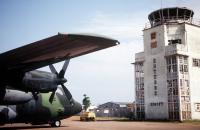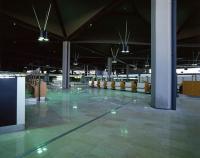-
Women’s connections, role in extremist networks
Researchers who examined the role of women in extreme networks or organizations, such as terrorist groups, dispelled the common assumption that women are lured into these dangerous environments solely to offer support while men are recruited and tend to be the key players. Instead, the researchers found, women are better connected within the network, essentially becoming the glue holding the system together, fueling its vitality and survival.
-
-
Understanding California electricity crisis may help prevent future crises
Between 2000 and 2001, California experienced the biggest electricity crisis in the United States since the Second World War. Exactly how it happened, however, is complex. New research now reveals insights into the market dynamics at play, potentially helping regulators standardize the market and prevent future crises.
-
-
Baghdad terrorist attack’s death toll reaches 175

Iraqi officials say that the death toll from Saturday’s massive ISIS suicide bombing near two busy shopping malls in Baghdad now stands at 175. The number is going to rise, as more bodies are being recovered from the destroyed and burned-down buildings. Prime Minister Haider al-Abadi ordered the bolstering of security measures in Baghdad and other cities. These measures include the withdrawal of a fake hand-held bomb-detection device which has been used at Iraqi security checkpoints.
-
-
Suicide bombers attack mosque in Medina, other Saudi targets
In an escalation of violence in Saudi Arabia, suicide bombers on Monday killed four Saudi security forces in an attack outside the Prophet’s Mosque in Medina, one of the two holiest sites in Islam. The bombing outside the Medina mosque was one of a series of attacks in Saudi Arabia on Monday. The bombings reflected ISIS strategy of targeting of Shia Muslims and U.S. interests, as well as attacking targets important to Sunni regimes which ISIS regard as corrupt.. Experts note, though, that the attack on or near one of the holiest sites in Islam is a significant escalation in ISIS campaign.
-
-
The Entebbe rescue, 40 years later

On 4 July 1976 — 40 years ago Monday — Israeli commandos carried out a daring raid to rescue over 100 Jewish and Israeli hostages held by Palestinian and German terrorists at the Entebbe airport in Uganda. A week earlier, two terrorists from the Popular Front for the Liberation of Palestine (PFLP) and two German terrorists from the Baader-Meinhoff gang had hijacked Air France flight 139 as it took off from Athens bound for Paris, the final leg of its journey that had begun in Tel Aviv. When the plane landed in Uganda, the Jewish and Israeli passengers were separated from the others.
-
-
A legend is born
On 6 July1976, two days after the daring Israeli commando raid which rescued more than 100 hostages who were being held by Palestinian and German terrorists at the Entebbe international airport in Uganda, the New York Times published an editorial, titled “A legend is Born.” “By this unprecedented action, the Israelis have demonstrated that the criminal terrorist practice of holding the lives of innocent civilians for ransom to achieve political ends can be successfully thwarted by application of sufficient amounts of resourcefulness, determination—and guts,” the Times wrote.
-
-
Aurora movie theater owner seeks $700,000 from families of mass shooting victims

A Colorado jury ruled that Cinemark was not responsible for the 2012 massacre in an Aurora, Colorado, movie theater, in which twelve people were killed and seventy injured – and now Cinemax, the owner of the movie theater, is demanding that the families of the victims of the mass shooting pay $699, 187.13 to cover the company’s legal costs defending itself.
-
-
Brazil lends $895 million to Rio de Janeiro for Olympics security
Brazil’s government has loaned 2.9 billion reais ($895 million) to the state of Rio de Janeiro to cover some of the security costs of the Olympic Games, which open on 5 August. The state of Rio de Janeiro last week declared a state of fiscal emergency. Government officials said the loan was meant to guarantee safety and security at the Olympic Games. As many as half a million foreign visitors are expected to arrive in Rio during the state’s worst financial crisis in decades.
-
-
Explaining the Istanbul bombing: Turkey’s six foreign policy sins

The terror attack at Istanbul’s Ataturk airport overshadowed two major headline events: Turkey’s bridging the rifts with Russia and normalizing relations with Israel. Both these events had to do with Turkey attempting to change course on policies that may well have opened the door to the airport bombing. Turkey’s view of the Kurds – in both Turkey and Syria – as the major threat Turkey was facing had led it toturn a blind eye to Islamic radicalism brewing in its backyard. In fact, Turkey helped ISIS by buying oil from ISIS-controlled oil fields, and allowed thousands of foreigners to go through Turkey on their way to join ISIS. Turkey hoped that ISIS would defeat the Syrian Kurds, and also take out President Assad, Turkey’s nemesis, but ISIS has failed on both fronts. Turkey has begun to distance itself from ISIS, and in response the Islamist organization has begun to launch suicide attacks against Turkish targets. Burying the hatchets with Russia and Israel might make Turkey more secure in the region, and signal to the rest of the international community that more substantive positive changes in Turkish foreign policy are yet to come. Only time will tell if they would include a more resolved Turkish response against ISIS.
-
-
New tool to measure homeland security risks
DHS has a broad and complex mission, with priorities that include preparing for and responding to a range of terrorist events, natural disasters, and major accidents.Researchers have applied a tool originally developed to address risks in environmental policy, the Deliberative Method for Ranking Risk, to aid in strategic planning for security.
-
-
House committee releases encryption report, laying foundation for a national dialogue

Terrorist attacks in Paris and San Bernardino have sparked a public debate on the use of encryption in the United States because the attackers used encrypted communications to evade detection, a phenomenon known as “going dark.” Earlier this week, the Majority Staff of the House Homeland Security Committee released a new report, titled Going Dark, Going Forward: A Primer on the Encryption Debate. The summarizes the committee’s findings, based on more than 100 meetings and briefings committee staff and members have held with key stakeholders over the past year.
-
-
Turkey identifies the three terrorists as a Russian, Uzbek, and Kyrgyz
Turkish security officials have said that the three terrorists who attacked the Istanbul airport were foreign nationals – a Russian, Uzbek, and Kyrgyz. The officials, who spoke with Western news agencies, said that investigators faced difficulties identifying the bombers from their limited remains, but a pro-government Turkish newspaper had said the Russian bomber was from Dagestan, a restless province which borders Chechnya.
-
-
U.S. airstrikes kill more than 250 ISIS militants outside Fallujah
A U.S.-led coalition airstrikes on Wednesday killed more than 250 ISIS Islamist militants as they tried to leave the Iraqi city of Fallujah in a 40-vehicle convoy. U.S. officials said that the number of casualties is likely to be higher. It was one the deadliest coalition’s strikes against ISIS.
-
-
New death threats targeted Charlie Hebdo’s editorial staff
French security services are investigating death threats made towards the satirical magazine Charlie Hebdo. Le Parisien reports that a source close to the investigation told the newspaper the first threat was posted on the magazine’s Facebook account before being removed by an unknown person.
-
-
41 killed, 239 injured in three suicide explosions at Istanbul Atatürk airport

Turkish authorities say that forty-one people have been killed and 239injured in a terrorist attack on Turkey’s largest airport, Istanbul Atatürk. The airport is Europe’s third busiest airport. The Turkish Ministry of Justice said that two terrorists blew themselves up outside the security checkpoint at the entry to the international terminal. A third terrorist blew himself up in the terminal’s parking lot. Recent months have seen an increase in terrorist attacks against Turkish civilians. These attacks have been carried out by both ISIS Islamists and PKK Kurdish separatists.
-
More headlines
The long view
Preventing Another 'Jan. 6' Starts by Changing How Elections Are Certified, Experts Say
The 2024 presidential election may be a rematch between President Joe Biden and former President Donald Trump, but preventing a repeat of Jan. 6, 2021 — when false claims of a stolen election promoted by Donald Trump and his allies led to an insurrection at the U.S. Capitol —will be top of mind this election year. Research finds broad support among public for nonpartisan certification commissions.
States Rush to Combat AI Threat to Elections
This year’s presidential election will be the first since generative AI became widely available. That’s raising fears that millions of voters could be deceived by a barrage of political deepfakes. Congress has done little to address the issue, but states are moving aggressively to respond — though questions remain about how effective any new measures to combat AI-created disinformation will be.
Chinese Government Hackers Targeted Critics of China, U.S. Businesses and Politicians
An indictment was unsealed Monday charging seven nationals of the People’s Republic of China (PRC) with conspiracy to commit computer intrusions and conspiracy to commit wire fraud for their involvement in a PRC-based hacking group that spent approximately 14 years targeting U.S. and foreign critics, businesses, and political officials in furtherance of the PRC’s economic espionage and foreign intelligence objectives.
European Arms Imports Nearly Double, U.S. and French Exports Rise, and Russian Exports Fall Sharply
States in Europe almost doubled their imports of major arms (+94 per cent) between 2014–18 and 2019–23. The United States increased its arms exports by 17 per cent between 2014–18 and 2019–23, while Russia’s arms exports halved. Russia was for the first time the third largest arms exporter, falling just behind France.
LNG Exports Have Had No Impact on Domestic Energy Costs: Analysis
U.S. liquified natural gas (LNG) exports have not had any sustained and significant direct impact on U.S. natural gas prices and have, in fact, spurred production and productivity gains, which contribute to downward pressure on domestic prices.
Don’t Buy Moscow’s Shameless Campaign Tying Biden to Its Terrorist Attack
Russia has offered many different explanations to the ISIS-K’s 22 March 2024 terrorist attack at the Crocus City Hall in Moscow, but the most recent explanation offered by Russia is the most audacious yet: Russia now charges that the Ukrainian energy company Burisma financed the attack. Burisma is at the center of an effort by a congressional committee to impeach President Biden, but the case has all but collapsed. Hunter Stoll writes that Russia’s disinformation and propaganda apparatus appears to be searching for ways to keep Burisma in the news ahead of the U.S. presidential election.
